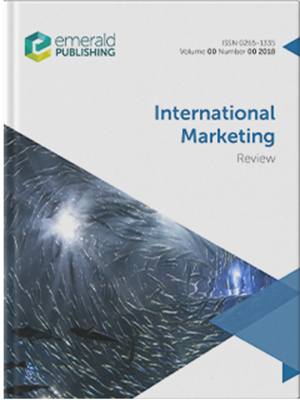Effective marketing strategies for global FMCG brands during COVID-19 pandemic crisis
IF 4.6
3区 管理学
Q1 BUSINESS
引用次数: 2
Abstract
PurposeThis study proposes marketing strategies for global fast-moving consumer good (FMCG) brands to survive and thrive in the turbulent economic environment created by COVID-19. The authors investigate the indirect effects of consumer ethnocentrism (CET) and consumer confidence (CC) on customer equity drivers (CEDs)’ effectiveness in influencing repurchase intention (RI) for global FMCG brands.Design/methodology/approachThis study uses the mall-intercept technique. Respondents were randomly approached at popular retail and shopping destinations in Athens, Greece, and 228 customer participants completed the survey.FindingsCET and CC weaken the positive relationship between certain CEDs and RI of FMCG brands. Particularly, the effects of relationship equity (RE) and value equity (VE) on strengthening repeated purchases are higher for low-confidence or low-ethnocentric consumers. Thus, marketing strategies for enhancing value and creating stronger consumer–brand relationships are more effective in boosting repeated purchases during economic turbulence.Practical implicationsPractitioners and academicians can use the insights obtained from this study to determine how to allocate resources and adopt the most effective marketing strategies in local environments based on consumer preference for domestic or global products and consumer morale and expectations for future financial status.Originality/valueThis research unveils the mechanism behind the moderating effects of CET and CC on the effectiveness of CEDs in global FMCG settings using social identity and system justification theory. Turbulence in international and local markets due to the pandemic has revealed that marketing function needs to redesign strategies and coordinate practices to boost repeat purchases.新冠肺炎疫情危机期间全球快速消费品品牌的有效营销策略
目的本研究提出了全球快速消费品(FMCG)品牌在新冠肺炎造成的动荡经济环境中生存和繁荣的营销策略。作者研究了消费者种族中心主义(CET)和消费者信心(CC)对客户权益驱动因素(CED)影响全球快速消费品品牌回购意愿(RI)的有效性的间接影响。设计/方法论/方法本研究采用了mall截距技术。受访者在希腊雅典的热门零售和购物目的地被随机联系,228名客户参与者完成了调查。CET和CC削弱了快速消费品品牌某些CED与RI之间的正向关系。特别是,对于低信心或低种族中心的消费者,关系公平(RE)和价值公平(VE)对加强重复购买的影响更大。因此,在经济动荡期间,提高价值和建立更牢固的消费者-品牌关系的营销策略更能有效地促进重复购买。实践意义从业者和学者可以利用从这项研究中获得的见解,根据消费者对国内或全球产品的偏好、消费者士气和对未来财务状况的期望,确定如何在当地环境中分配资源并采取最有效的营销策略。独创性/价值本研究利用社会认同和系统正当性理论揭示了CET和CC对全球快速消费品环境中CED有效性的调节作用背后的机制。疫情导致的国际和本地市场动荡表明,营销职能部门需要重新设计战略和协调做法,以促进重复购买。
本文章由计算机程序翻译,如有差异,请以英文原文为准。
求助全文
约1分钟内获得全文
求助全文
来源期刊

International Marketing Review
BUSINESS-
CiteScore
8.70
自引率
12.00%
发文量
55
期刊介绍:
International Marketing Review (IMR) is a journal that has, as its core remit, the goal of publishing research that pushes back the boundaries of international marketing knowledge. IMR does this by publishing novel research ideas, and by publishing papers that add substance to, question the basic assumptions of, reframe, or otherwise shape what we think we know within in the international marketing field. IMR is pluralistic, publishing papers that are conceptual, quantitative-empirical, or qualitative-empirical. At IMR, we aim to be a journal that recognizes great papers and great research ideas, and works hard with authors to nurture those ideas through to publication. We aim to be a journal that is proactive in developing the research agenda in international marketing, by identifying critical research issues, and promoting research within those areas. Finally, IMR is a journal that is comfortable exploring, and that fosters the exploration of, the interfaces and overlaps between international marketing and other business disciplines. Where no interfaces or overlaps exist, IMR will be a journal that is ready to create them. IMR’s definition of international marketing is purposefully broad and includes, although is not restricted to: -International market entry decisions and relationships; -Export marketing and supply chain issues; -International retailing; -International channel management; -Consumer ethnocentrism, country and product image and origin effects; -Cultural considerations in international marketing; -International marketing strategy; -Aspects of international marketing management such as international branding, advertising and new product development.
 求助内容:
求助内容: 应助结果提醒方式:
应助结果提醒方式:


